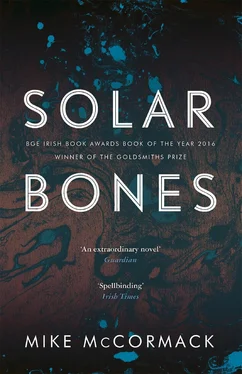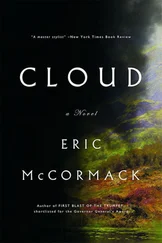until now
standing at the gable of the house, looking out over the fields towards the Westport road in the distance and the side of Croagh Patrick fading into the evening light, Agnes still speaking away on the other end of the line as a light shower of rain drifted over the house, thickening to a heavy mist which moved on to pile up in swathes against the slopes of Mweelrea, another wet evening as promised, nothing but solid rain from the beginning of March with no let up so you couldn’t walk the land for fear of going up to your ankles in it and there was still another three weeks before the clocks would turn to summer time when darkness would not settle in till after seven o’clock and even if there was no assurance as yet that the weather would take up any time soon it was good to think of summer only a few weeks away with the sun higher in the sky and the first blackthorn around the house coming into flower while later on the woodbine, which Mairead had tended in the wild hedge, would scent up the whole back garden close to the house, this side of the sheds and the haggard beyond before
Agnes’s voice tapered off, her apocalypse complete — the city’s civil defence plans overwhelmed, riots in the streets, council chambers overrun and trashed by protestors — Agnes exhausted now, like the scenario itself, so she finished up telling me that she would let me know if she learned anything else and to give Mam her love before she
rung off, her voice suddenly gone as if it had snagged on the mist and was carried off into the failing light, leaving the phone dead in my hand, a warm sliver with the screen fading like some luminous shard from outer space which had travelled across stellar distances at great speed to arrive here in my hand where its glow was now losing its heat, gone, before I pocketed it and turned back into the house to check on Mairead and tell her that Agnes had just called but that I had told her not to come home as I figured she had other more pressing things to do — her work and everything — and Mairead nodded heavily, yes, that was the right thing to say, and it was good to have confirmed that I’d done the right thing so I could rest easy in myself for the rest of the evening, make something to eat and
later that night I sat alone in the sitting room, feeling the whole house strange around me with Mairead tossing in a fevered sleep among the soft toys, posters and CDs — all the detritus of Agnes’s adolescence — Mairead now washed up there by the swell of her fever and drifting through the damp currents of her sleep as if she inhabited some separate medium in which everything was given over to a drift and fade, space and time warped so that those hours ahead of me appeared completely unmappable and unpredictable even if it was likely they would pass in the same inescapable boredom as the previous couple of days, a prospect which made me gloomy as there appeared no way out of it now — Mairead was too ill to sneak away from for a few pints — so that when the idea of Skyping Darragh came to me it took me a long moment to set it aside, because even if a chat with him was a pleasing prospect — I knew full well that any conversation now ran the risk of having to tell him of his mother’s illness and, from what I could see, there was no good reason to mention it to him as it would probably do nothing but make him anxious about something that would run its course in a few days, something neither of us could do much about, so I forgot about it and
got a beer from the fridge and settled down to scan through the TV channels, all thirty of them — sport, drama, docs, cartoons, the whole lot — only to inevitably lock onto Sky News where I learned that the actor Paul Scofield had passed away from leukaemia while the surge of troops into Iraq was ongoing and the weather for the following week would continue with more of the rain that had been blowing in from a cyclone in the mid-Atlantic for the past three weeks with no let-up till Thursday at the earliest which might bring a dry spell but with a sharp drop in temperature, at which point I got fed up and flicked on through the channels once more, films, comedy, sci-fi, more news, until I chanced upon a documentary which showed
a grown man lying on a floor covered with large sheets of paper, A2 sheets on which there were some very complex and detailed line drawings, page after page covered, and this narrow shouldered man in a white shirt stretched out in the middle of them, drawing away with pencil and rule, adding yet another detailed sheet to all those around him and I must have recognised the sort of drawings they were because I found myself sitting forward in the armchair, prodding the zapper in my hand to turn up the volume so that I could hear the voiceover tell me that this man — some French man whose name I can’t remember — suffered from a sort of high-level autism that left him socially inept and completely without any sense of humour or irony but who was nevertheless designing out of thin air the most complete and complex urban plan history had ever known, a project which had come to light when a few of the drawings were used to illustrate a Sunday Times Magazine article on autism, which brought him to the attention of an urban planner at London City Council who marvelled at the precise beauty of its streets and thoroughfares but who was a lot more intrigued by the sprawling harmony hinted at beyond the margins of the cropped fragments and so took himself off to France to investigate this gifted planner whom no one in the urban design community had ever heard of, finding him eventually in a little village in the Vosges where he lived with his partner, a mathematician and herself autistic, and who, after he’d spent a couple of days there, convinced the planner that he had encountered a fully fledged genius — a visionary who had not only a coherent sense of the vast megalopolis which, after fifteen years, was still metastasising, day by day over pages and pages, an astonishing achievement in itself but more impressive from the point of view of a city planner was this man’s ability to hold in his mind’s eye a sense of the city as an enormous, dynamic organism which was continually morphing through the vast tides of those circadian rhythms that governed all its streets and infrastructure and which this seer outlined with sweeping gestures over the sheets of paper spread across the sitting-room floor, speaking in a toneless voice which swept through the city with a running commentary on how it was performing at any specific time of the day, how and where all its crowds and traffic were flowing and what routes they took to what points of convergence in the early morning rush hour, and what exactly the drain on utilities would be — how all its vertical and horizontal circuitry was functioning when water and electricity followed in the wake of crowds converging for work or entertainment in various parts and times of the city while disgorging a flow of sewage, hydrocarbons and CO2 emissions from those same points, this savant holding in mind all the flows and shifts through the city’s streets and conduit, vast rhythms he could gauge to any hour of the day, any day of the week or any holiday, a phenomenal feat which had the urban planner at a loss to find some comparative image or simile — he talked about a 3D chess game and a multi-tiered symphony of people and environment — all vivid and suggestive but each one falling some way short of the city’s majestic, multi-harmonic sprawl — while all the time speaking to camera the seer himself was down on the floor behind him with his pencil and square, adding yet another precinct to the city’s expanse — a working-class suburban enclave with housing grouped around schools and shopping facilities, parking and leisure amenities, the concrete substratum of a fully realised community — while the city now stood, after fifteen years’ solid work but with no end yet in sight, as by far the biggest and most complex urban plan ever conceived by man or committee and which I could not help thinking, as I sipped my beer and watched, would, if he stuck at it and lived long enough, eclipse the whole fucking world, this map of a kingdom that existed nowhere on this earth but in his head, this masterpiece with its clueless overlord, a mad king who knew nothing of the real world but was nevertheless on such intimate terms with the infinite intricacies of his own mind that he needed nothing more than a rule and pencil to draw them forth and lay them on the paper, this city as a kind of neural maze, a cognitive map which would reach out, street by street, to cover the whole world and possibly for this reason or for some other I could not fathom, the programme filled me with a sour bloom of resentment the focus of which I could not clearly discern but which quickly had me feeling so foolish I was embarrassed to be alone with myself in the sitting room, feeling that someone invisible outside of myself was standing judge and jury over me, pointing a finger at me, saying
Читать дальше












